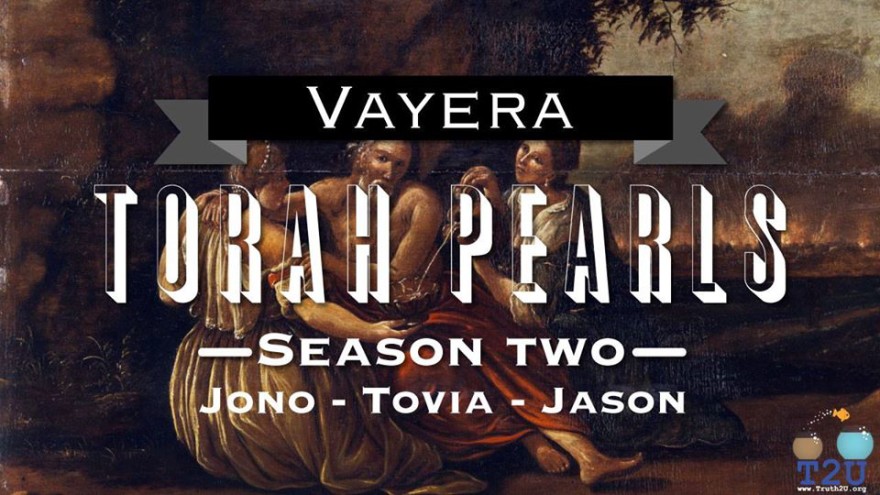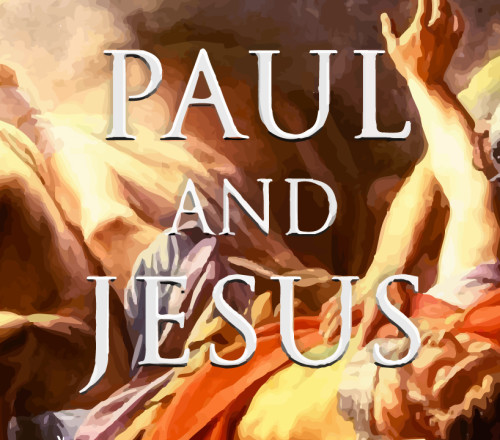Torah Pearls – Season 2 – Vayera – Rabbi Tovia Singer, Jono & Jason
Why did Lot offer his two daughters to the depraved men of Sodom and why did his daughters have sex with Lot? Why did God make a great nation of Ishmael? What is the Documentary Hypothesis and is it credible? All this and more in this week’s Torah Pearls!
Join us for this year’s Tanakh Tour of Israel!
Click here for our previous program on Genesis chapter 18!
[wp-post-slider]





I think you are talking about Pat Robertson.
I am confused in 20:12 Abraham said Sarah is the daughter of his father but not the daughter of his mother, making them half siblings. Where did niece come from? Is there something in the Hebrew that is wrong in our english translations?
When a son from Sarah was to be born he pleaded for Ismael to live, but when Isaac Was to be sacrificed he never pleaded anything. Was he hoping that yhwh had changed his mind & would call back Ismael to be his heir, maybe?
I want to thank you for providing excellent teachers on Torah. Truth2U has made me question much that I have been taught throughout my life. I grew up being taught this is what is truth, this is what saves you. This Jesus is savior. I didn’t know what a savior was, nor what a messiah should be, I just knew this was supposed to be true. My foundation is crumbled, my life rearranged and I have never felt better. Thank you for teachers such as Tovia. I laugh, I cry and I learn. Please continue to share. -Anna
Jacinthe, the point is that G-d had told Abraham that Isaac could inherit the covenant. Furthermore Abraham had argued with G-d to save the people of Sodom, knowing that G-d is just and would not allow the good to be killed due to the deeds of the evil people. The whole point of the Akeda (binding of Isaac) is that Abraham trusted G-d. Abraham was willing to go so far as to raise the knife because he trusted G-d. Abraham knows that G-d abhors human sacrifice, and further Abraham knows that G-d won’t kill the innocent. The whole point is that G-d will not allow human sacrifice.
How do we know this? Well, for one, Abraham doesn’t argue for the life of his son. Yet just a few lines before he argued to save the innocent of Sodom: Abraham asks G-d in Genesis 18:23 ‘Will You actually wipe out the innocent together with the guilty?
So Abraham would fight for the lives of strangers, but not for that of his son? This is after Abraham has also pleaded with G-d not to forget Ishmael — but on killing Isaac you think he would remain silent???
Then Abraham says in Genesis 18:25 “It would be sacrilege even to ascribe such an act to You – to kill the innocent with the guilty, letting the righteous and the wicked fare alike. It would be sacrilege to ascribe this to You! Shall the whole world’s Judge not act justly?”
Isn’t Isaac innocent? Isn’t G-d just? Yet you think Abraham wouldn’t even QUESTION the request?
And you are also forgetting that G-d has already promised Abraham that Isaac would inherit the covenant. Did G-d lie to Abraham? Did Abraham forget the promise and assume G-d was going to take his son? In Genesis 17:19 G-d said, ‘Still, your wife Sarah will give birth to a son. You must name him Isaac. I will keep My covenant with him as an eternal treaty, for his descendants after him.”
So G-d forgot His promise? Or Abraham forgot what G-d had told him???
Obviously neither forgot. And remember that we call the Akeda the “Binding of Isaac” — not the sacrifice. Abraham told Isaac in Genesis 22:8 ‘G-d will see to a lamb for an offering, my son,’ replied Abraham.
And G-d did just that.
I know this is an older post–forgive me for commenting, but I’ve only just listened to this episode.
Doesn’t the oral Torah contradict what Tovia Singer says about Deuteronomy 23:3-4, (prohibition of Moabites/Ammonites entering the assembly), that it can ONLY mean both men and women, and you have to have the oral Torah to give you the information that it excludes women?
I have found a number of instances in the Mishnah where it is stated that the tradition or Halacha is that women are excepted, but the only explanations I’ve found at to exactly why this is infer it directly from the text of Deuteronomy 23:3-4!
For example:
What is the reason why he gave instructions that inquiry be made concerning him? Because it is written, And Saul clad David with his apparel, being of the same size as his, and about Saul it is written, From his shoulders and upward he was tallerer than any of the people. Doeg the Edomite then said to him, ‘Instead of inquiring whether he is fit to be king or not, inquire rather whether he is permitted to enter the assembly or not’! ‘What is the reason’? ‘Because he is descended from Ruth the Moabitess’. Said Avner to him, ‘We learned: An Ammonite, but not an Ammonitess; A Moabite, but not a Moabitess! . . . ‘Does then Egyptian exclude the Egyptian woman’? ‘Here it is different, since the reason for the Scriptural text is explicitly stated: Because they met you not with bread and with water; it is customary for a man to meet [wayfarers]; It is not, however, customary for a woman to meet [them]’. ‘The men should have met the men and the women the women!’ (from Yevamot 76b)
The Gemara comments that this disagreement with regard to the source of the halakha that it is permitted for an Ammonite or Moabite woman to enter into the congregation is like the following dispute between tanna’im: The verse states: “An Ammonite or a Moabite” (Deuteronomy 23:4); an Ammonite man is barred from entering into the congregation, but not an Ammonite woman, and similarly, a Moabite man is barred from entering into the congregation, but not a Moabite woman. This is the statement of Rabbi Yehuda, who derives the halakha from the masculine form of these two terms. Rabbi Shimon says: The verse states: “Because they did not meet you with bread and with water on the way” (Deuteronomy 23:5). Since it is the way of a man, but not the way of a woman, to go forth to meet guests, females were not included in the prohibition. (from Yevamot 77a)
The claim is the oral Torah is of divine origin with additional clarifications directly from the creator, and then one finds in a case like this that if you actually look for it, you find the answer is inferred from the written Torah, not from some divine appendix to it.